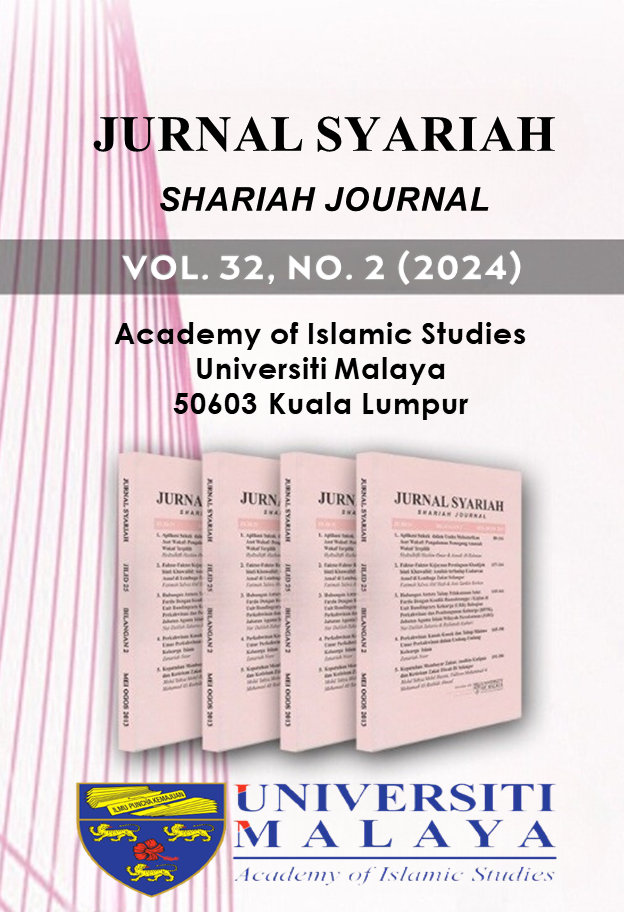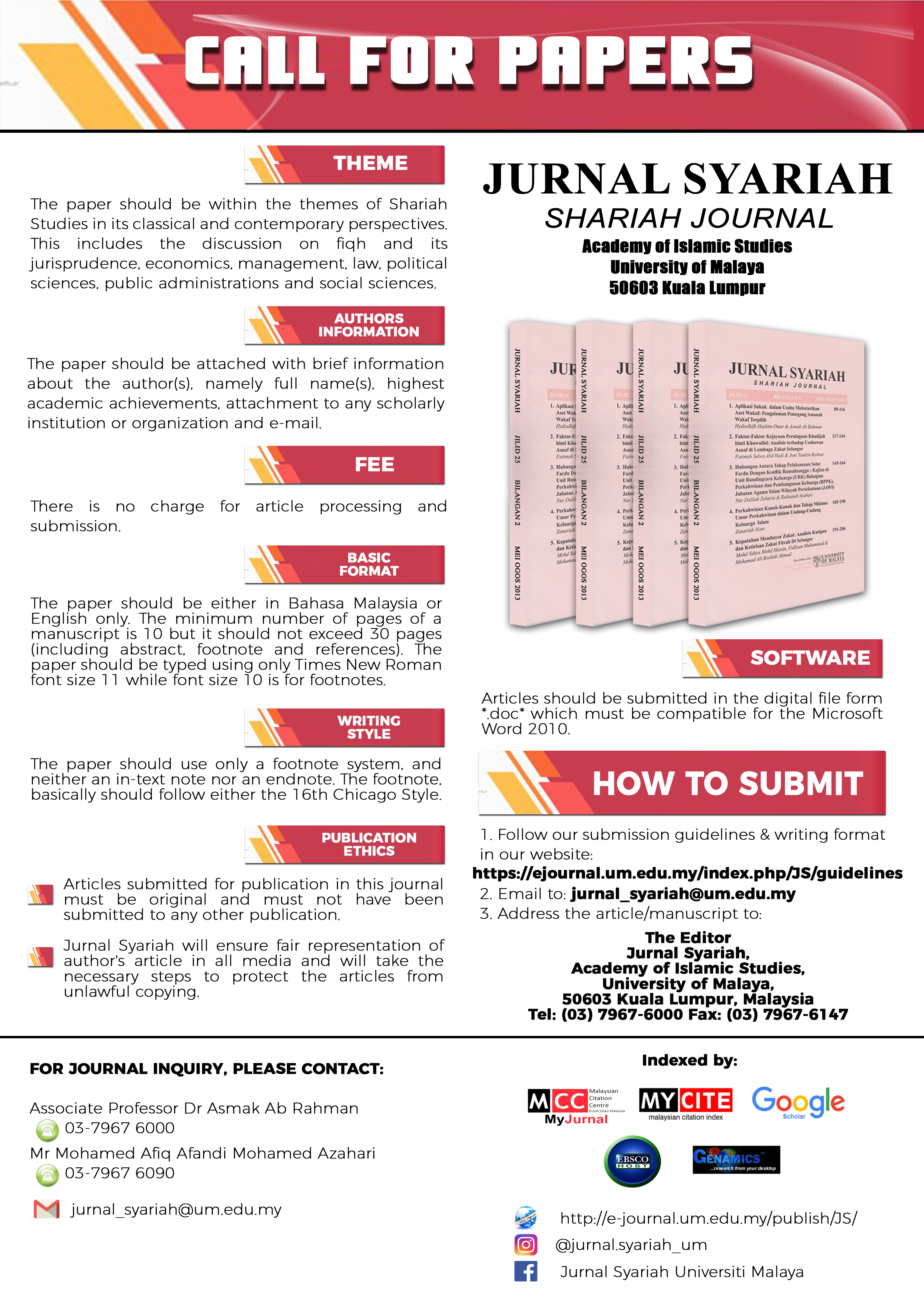POWER OF PARDON IN THE SHARĪ‘AH AND ITS APPLICABILITY IN COMMON LAW
DOI:
https://doi.org/10.22452/syariah.vol32no2.2Keywords:
power of pardon, Sharīʿah, common law, justice, harmonisation of pardon principlesAbstract
The power of pardon is an important principle for umholding justice in the criminal justice systems of both common law and the Sharīʿah. The Sharīʿah pardon principle provides a fair opportunity for the victims or victims’ heirs in murder cases to express their preferences as to how the offenders should be pardoned, and while also ensuring the perpetrators’ rights as both disputing parties have to participate in the pardon process actively. However, the Sharīʿah pardon principle has certain inadequacies compared to the common law pardon process that hinder its independent implementation in the existing common law pardon process. The current common law pardon process can also be considered arbitrary and one-sided compared to the Sharīʿah pardon principle because the pardon petitions are decided exclusively by the state authorities, and victims or victims’ heirs in murder cases are not heard or compensated. Therefore, this study aims to examine the Sharīʿah pardon principle and explore its potential to enhance justice in the common law pardon decision-making process. This study utilises a qualitative doctrinal method depending on the requirements for pardon as outlined in cases of qiṣāṣ. Primary attention is given to the relevant Qur’ānic verses, the Sunnah and a review of the juristic opinions on the extent of the application of these rules. This study submits that the common law pardon process can be improved if it is harmonised with the Sharīʿah pardon principle. This article further suggests how this harmonisation effort can be realised to develop an implementable and balanced pardon decision-making process that can enhance justice in common law jurisdictions.
Downloads
References
Abu Zahrah, Muhammad. Al-Jarimah Wa-al ‘Uqubah fi al-Fiqh al- Islami: al-‘Uqubah. ed. 10. ed. Muhiyuddin Fathi al-Shaludi) Cairo: Dar al-Fikr al-‘Arabi, 2006).
Abu Zahrah. Al-Jarimah Wa-al-‘uqubah fi Al-fiqh Al-islam Al-‘uqubah (Dar al Fikr al ‘Arabi, 1996).
Adil, Mohamed Azam Mohamed, and Ahmad Badri Abdullah. “The Application of Shariah Principles of Ta’zir in Malaysian Common Law: A Maqasid-Based Proposal.” Islam and Civilisational Renewal (ICR) 7, no. 1, 2016.
Adil, Mohamed Azam Mohamed. “Islam prefers mercy over retribution.” International Institute of Advanced Islamic Studies (IAIS) Malaysia. June 22, 2022, https://iais.org.my/publications-sp-1447159098/dirasat-sp-1862130118/shariah-law-governance-halal/item/1343-islam-prefers-mercy-over-retribution.
Adli, Osama. Diyya Al-Qatl [Blood Money in Homicide] (Cairo, Dar Al-Nahda Al-Arabia 1985).
Ahmed, Barakat. Muhammad and The Jew: A Re-Examination (Indian Institute of Islamic Studies, 1979).
Al Bukhari in his Sahih. Hadith No. 3209.
Al-Kashif, Abd El-Rehim Mohamed. “Shari’ah’s Normative Framework as to Financial Crime and Abuse.” Journal of Financial Crime 16, no. 1, 2009.
Al-Maqdisi (Ibn-Qudamah), Mawaffaq Al-Din Abdullah Ibn Ahmad Ibn Qudamah. Al-Mughni, vol. 9 (Beirut, Dar Al-Kilab Al-Arabi).
Al-Mawardi. al-Ahkam as-Sultaniyah, vol. 6 (Dar al-Fikr, Beirut, 1983).
Al-Qaradawi, Yusuf. Shari’ah al-Islam Salihah lit-Tatbiq fi Kulli Zaman wa Makan (Cairo: Dar al-Sahwah, 1393/1972).
Al-Tabari. The History of Al-Tabari. vol. viii: The Victory of Islam. 1997.
An‐Na’im, Abdullahi Ahmed. “The compatibility dialectic: Mediating the legitimate coexistence of Islamic law and state law.” The Modern Law Review 73, no. 1, 2010.
An-Nasa’i, Imim Hifiz Abo Abdur Rahman Ahmad Bin Shu’aib Bin Ali. English Translation of Sunan An-Nasa’i. Nasiruddin Al-Khattab trans., Riyadh: Darussalam 2007. http://www.kalamullah.com/sunan-an-nasai.html, hadith no. 4788.
Ansari, Muhammad Tufail. Sunan ibn Majah (English Version). vol. 4, Hadith no. 2693.
‘Awdah, Abdul Qadir. Al-Tashri Al-Jinai Al-Islami Muqaranan Bi-Al-Qanun Al-Wadi [Islamic Criminal Law Compared with Positive Law]. vol. 2 (Cairo: Dar Al-Turath. 1985).
‘Awdah, Abdul Qadir. Criminal Law of Islam, vol. II, ed. 1 (Karachi, 1987).
Aykut, Ebru. “Judicial Reforms, Sharia Law, and the Death Penalty in the Late Ottoman Empire.” Journal of the Ottoman and Turkish Studies Association 4, no. 1, 2017.
Baderin, Mashood A.. “Administration of Justice under the Shari’ah, Common Law and Civil Law System: Towards a Better Understanding.” Malaysian Journal of Syariah and Law 2, no. 1, 2010.
Baderin, Mashood A.. “The evolution of Islamic law of nations and the modern international order: Universal peace through mutuality and cooperation.” American Journal of Islamic Social Sciences 17, no. 2, 2000.
Beaumont, Gustave De, and Alexis de Tocqueville. On the penitentiary system in the United States and its application to France, trans. Emily Katherine Ferkaluk (Palgrave Macmillan, 2018).
Bearman, Peri. The Ashgate research companion to Islamic law (Routledge, 2014).
Bin Ash’ath, Imam Hafiz Abu Dawud Sulaiman. English Translation of Sunan Abu Dawud. Nasiruddin al-Khattab trans. (Riyadh: Darussalam 2008), http://www.kalamullah.com/sunan-abu-dawood.html. hadith no. 1879.
Black, Ann, Hossein Esmaeili and Nadirsyah Hosen. Modern Perspectives on Islamic Law (Edward Elgar Publishing, 2013).
El-Sheikh, Mohamad A.. The Applicability of Islamic Penal Law (Qisas and Diyah) in the Sudan (Temple University, 1987)
Funk, David A.. “Traditional Islamic Jurisprudence: Justifying Islamic Law and Government.” Southern University Law Review 20, 1993.
Gouda, Moamen. “Islamic constitutionalism and rule of law: a constitutional economics perspective.” Constitutional Political Economy 24, no. 1, 2013.
Hascall, Susan C.. “Shari’ah and Choice: What the United States Should Learn from Islamic Law about the Role of Victims’ Families in Death Penalty Cases.” The John Marshall Law Review 44, no. 1, 2010.
Ibn Ishaq, Sirah Rosul Allah. Alfred Guillaume trans (Oxford. 1997).
Kamali, Mohammad Hashim, Mohamed Azam Mohamed Adil, and Wan Naim Wan Mansor. “Death Penalty in Shariah and Contemporary Law: A Comparative Analysis.” Policy Issue Papers (PIP), No. 11, International Institute of Advanced Islamic Studies, 2020.
Kamali, Mohammad Hashim. “Principles and Philosophy of Punishment in Islamic Law with Special Reference to Malaysia.” Islam and Civilisational Renewal Journal 10, no. 1, 2019.
Kamali, Mohammad Hashim. “Amnesty and Pardon in Islamic Law with Special Reference to Post-Conflict Justice,” Islam and Civilisational Renewal Journal 6, no. 4, 2015.
Kamali, Mohammad Hashim. “Exploring Facets of Islam on Security and Peace: Amnesty and Pardon in Islamic Law.” Islam and Civilisational Renewal (ICR) 3, no. 3, 2012.
Kamali, Mohammad Hashim. “Shari’ah and civil law: Towards a methodology of harmonisation.” Islamic Law and Society 14, no. 3, 2007.
Karim, Ridoan, Shah Newaz, and Ahmed Kabir. “A Comparative Analysis of Retributive Justice and the Law of Qisas.” Journal of Nusantara Studies 2, no. 2, 2017.
Novak, Andrew. “Transparency and Comparative Executive Clemency: Global Lessons for Pardon Reform in the United States.” University of Michigan Journal of Law Reform 4, no. 4, 2016.
Pascoe, Daniel, and Michelle Miao, “Victim–Perpetrator Reconciliation Agreements: What Can Muslim-Majority Jurisdictions and the Prc Learn from Each Other?” International and Comparative Law Quarterly 66, no. 4, 2017.
Peters, Rudolph. Crime and punishment in Islamic law: theory and practice from the sixteenth to the twenty-first century (Cambridge University Press, 2005).
Powell, Russell. “Forgiveness in Islamic ethics and jurisprudence.” Berkeley J. Middle E. & Islamic L. 4, 2011.
Quraishi-Landes, Asifa. “Islamic Constitutionalism: Not Secular. Not Theocratic. Not Impossible.” Rutgers Journal of Law & Religion 16, 2015.
Qafisheh, Mutaz M.. “Restorative Justice in the Islamic Penal Law: A Contribution to the Global System.” International Journal of Criminal Justice Sciences 7, no. 1, 2012.
Ramadan, Said. Islamic Law: Its Scope and Equity. 1961.
Rofiah, Dr. Nur, Bil. Uzm and Imam Nahe’i, M.H. I., The Study of Law and Punishment in Islam: The Ideal Concept of Hudud and Its Practices (Komnas Perempuan, Jakarta, Indonesia, 2016).
Saleh, Abdel Ghaffar Ibrahim. Al-Qisas Fi Al-Nufs Fi Al-Figh Al-Islami [Qisas in Murder Under Islamic Jurisprudence]: A Comparative Study. ed. 2, 1998.
Shabbir, Mohammad. Outlines of criminal law and justice in Islam (International Law Book Services, 2002).
Shafi’i, Al-Umm, vol. 7 (Dar al-Fikr, Beirut, 1990).
Sohih Muslim. Hadith No. 4945.
Tajuddin, Hanifah Haydar Ali, and Nasimah Hussin. Harmonising Criminal Justice System in Shari’ah and Common Law: The Challenge of Harmonisation, ed. Adnan Trakic (Walter de Gruyter GmbH & Co KG).
Tyler, Aaron. Tolerance as a Source of Peace: Gulen and the Islamic Conceptualisation of Tolerance. http//gulenconference.net/files/George town/2008-AaronTyler.pdf. 2008.
Waqas, Muhammad, and Humdia Qaiser. “A Comparative Analysis of Punishments Awarded in Islamic Legal System and Western Legal System.” International Research Journal of Social Sciences 3, no.11, 2014.
Yasilova, Hakam, ed. The Farewell Sermon of Prophet Mohammed (PBUH) (Tughra. 2004).
Zawawi, Majdah, and Nasimah Hussin. “Forgiving the enemy: A comparative analysis of the concept of forgiveness in Shari’ah and Malaysian Law.” Pertanika Journal of Social Science & Humanities 23. 2015.
Downloads
Published
How to Cite
Issue
Section
License
Copyright (c) 2025 Jurnal Syariah

This work is licensed under a Creative Commons Attribution-NonCommercial 4.0 International License.
COPYRIGHT: All rights reserved. Not allowed to be reproduced any part of articles and contents of this journal in any form or by any way, whether electronic, mechanical, photocopying, recording or otherwise without permission in writing from the Chief Editor, Jurnal Syariah.



















